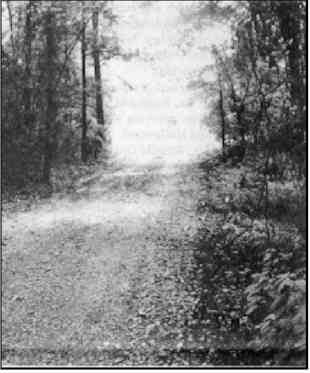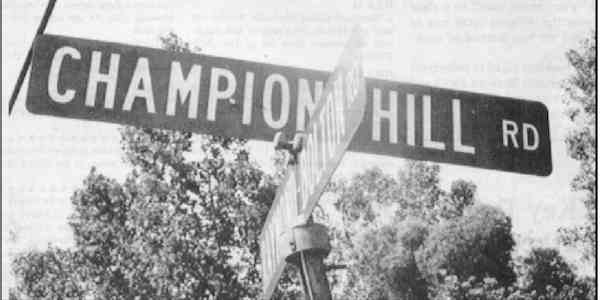The Battle of Champion
Hill, by Rebecca Blackwell Drake A wealth of material has been written in past years regarding the Battle of Champion Hill. On the other hand, relatively little has been recorded about the pioneer family, the Champions, whose house and property fell victim to one of the fiercest battles fought during the war. In this interview, Sidney S. Champion, IV, reminisces, with clarity, stories told to him about the lives of his great ancestors as they sought to endure the Battle of Champion Hill as well as the war in general. Sidney S. Champion, born in Gilford County, North Carolina in 1824, came to Mississippi and settled on a large tract of land located between Bolton and Edwards. He married Mary Matilda Montgomery from Madison County and had four children. Two of the children, Balfor and Mary, died before the age of 20. Wallace, their second son, became a medical doctor. Their youngest child, Sidney II, carried on the family name with a son, Sidney III, but died at the age of 36 with yellow fever.
Captain Champion was a seasoned Confederate soldier long before the outbreak of the Battle of Champion Hill. The night of May 15th found Captain Champion within range of the battle site and serving as a vital member of General Pemberton's staff. That same night, with her husband gone and afraid of the situation that was brewing, Matilda, and her house servants loaded a large dresser filled with personal items into a wagon. With the wagon loaded and the carriage ready, she and the children were prepared to leave Champion Hill the next morning by day break. By 7:00 a.m. the next day, Union officers and soldiers arrived in the Champion's yard. As Matilda drove her carriage down the lane and away from the home, a Union officer stopped her just long enough to order them to vacate the premises! The loaded wagon creaked along behind her carriage as she and the frightened children as well as a few servants, fled to the family home in Madison County. She later commented to her daughter-in-law, Olivia Feree Montgomery Champion, "before I arrived even as far as Bolton, I could hear cannon fire in the distance." Captain Champion was one of the soldiers fortunate enough to have survived the battle and make it, safely, back across the Big Black River. From Vicksburg he wrote to his wife in Madison County saying... "I am afraid our home is burned because when retiring from the field, I could see a plume of black smoke was rising." Not long after the Battle, Matilda returned to the plantation to find that her home was still standing and in good Order, but being used as a hospital for wounded and dying soldiers. To her dismay, she found the family's dining room table being used to perform amputations! In spite of the dim situation, she was hopeful that the Union troops would soon move on and she could restore the house to order. But, when the Union surgeons finished their work and prepared to move on toward Vicksburg, an over-exuberant soldier went against Grant's orders and burned the house to the ground! One hundred bales of hay also went up in flames! After the defeat of Vicksburg, Captain Champion was sent to a prison camp in Vicksburg but was later exchanged for a Union officer of equal rank. He rejoined the Cavalry and continued to fight for the cause of the Confederacy until the end of the war. He was wounded in Franklin, Tennessee, yet, resumed command of his troops. By the end of the war his final military rank was that of Lieutenant Colonel. After returning to Champion Hill he built another house for his family. The new one was located across the road from the burned home and facing the railroad tracks. For the next several years he remained in a state of poor health and never fully recovered from his battle wound. In 1867, two years after the war, he died leaving Matilda a widow with 4 children. Out of necessity, she took her children to the fields to work - then brought them home and taught each of them to read and write, as well as to speak correctly. Many years after the war, and the death of Matilda, Union veterans traveled south to re-visit the area known to them as Champion Hill. Mrs. Olivia Ferree Champion, wife and widow of Sidney Champion, 11, graciously received them in the family home and listened as they reminisced about the war. One of these visitors was a Union officer, a surgeon, who had treated the sick and wounded in the home during the battle. The physician told her... "while performing amputations on her dining room table, the blood would get so deep on the floor that a soldier had to take an ax and cut a hole in the floor so the blood could run out under the house." Other veterans would come to the Champion house - notice the old scarred table - and comment... "Well, Mrs. Champion, they took my leg off here - or my arm off there - and when taking my arm they had another man turned the other way - feet to head to me - taking his at the same time." At the Champion home in Jackson, a beautiful antique dresser stands in the bedroom of Mrs. Ruth Cosner Champion, widow of Sidney Champion, III. While reminiscing family stories, her son, Sidney Champion IV, points to the old dresser in a quiet voice comments... "that's the dresser that the slaves loaded into Matilda's wagon the day she left Champion Hill. Probably the main thing it held was the children's clothing." After all these years, the property is still retained by the Champion family and two descendants proudly bear the name of their great ancestor, Sidney Champion.
© 1998-2005, all rights reserved |

